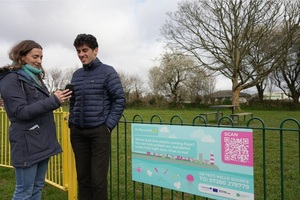Interactive preventing plastic pollution signs go live in Plymouth
The Environment Agency is on a mission to tackle plastic pollution with the launch of interactive 'Source to Sea' posters across Plymouth.

'Talking' to one of the new signs in Plymouth
Residents and visitors can now scan poster QR codes at multiple locations to find out how single-use avoidable plastic items - like nappies, packets, wet wipes and sanitary products - impact marine life when incorrectly flushed down the toilet or discarded in the open environment.
The eye-catching posters, which can be found on railings, bollards and lamp posts at the Barbican Waterfront and Hoe, University of Plymouth Hospital (inside only), city centre, and Mutley and Saltash Passage areas, enable people to have text message mobile phone chats about plastic types, the journey of plastic through drains and rivers, and their impacts on ocean health. There is also an engaging quiz and opportunity to share opinions on plastic pollution.
Environment Agency plastics and sustainability team project lead Lucy Smith said:
Every year more than 12 million tonnes of plastic enters the world’s ocean from land, rivers and marine activities. And around 967 kilograms of plastic waste has been removed from Plymouth in recent months according to our partner database, thanks to community-led litter pickers.
With the help of these interactive posters, we hope to clampdown on poor waste disposal habits by encouraging people to think how the health of our planet is shaped by our actions.
It can be really confusing knowing what type of waste goes where. We hope this project will engage people in a fun way and help break down complicated issues into straightforward action. Every individual can play a part in ocean health, and every positive action counts.
The initiative is one of many projects being funded by the 3 year cross channel Interreg Preventing Plastic Pollution project - a partnership of 18 organisations, including Plymouth City Council, Westcountry Rivers Trust and the University of Plymouth - which aims to identify and target plastic hotspots, embed behaviour change in local communities and businesses, and implement effective solutions and alternatives.
The posters plug into behaviour change ambitions by encouraging people to properly dispose of their waste and step up daily avoidable plastic habits by following the waste hierarchy - avoid, reduce, reuse, recycle. The posters will be in place for 12 months, after which the interactions will be evaluated to help inform future initiatives to prevent plastic pollution.
The project builds on Environment Agency goals and commitments outlined in its 5 year plan to create better places for people, wildlife and the environment.
As a regulator, the Environment Agency prevents waste plastic entering the environment by cracking down on waste crime and poor waste management. As an influencer, its ambition is to promote better environmental practices that result in a reduction of plastic waste.
Background
Interreg Preventing Plastic Pollution (PPP):
PPP is a €14million funded EU INTERREG VA France (Channel) England Programme project co-financed by the European Regional Development Fund which works mainly across pilot catchments: Brest Harbour, Bay of Douarnenez, Bay of Veys, Test and Itchen, East Hampshire, Poole Harbour, Medway, Tamar, and the Great Ouse catchments.
PPP seeks to understand and reduce the impacts of plastic pollution in the river and marine environments by looking at the catchments from source to sea.
Partners are the Environment Agency, Department for Environment, Food and Rural Affairs, Queen Mary University of London, LABOCEA Conseil, Expertise et Analyses, Syndicat mixte établissement public de gestion et d’aménagement de la baie de Douarnenez, Office Français De La Biodiversité, Parc naturel marin d’Iroise, Brest Métropole, Centre national de la recherche scientifique, Counseil départemental de la Manche, Institut français de recherche pour l’exploitation de la mer, The Rivers Trust, Syndicat de bassin de l’Elorn, ACTIMAR, Brest’aim, Westcountry Rivers Trust, South East Rivers Trust, and Plymouth City Council.
Hello Lamp Post
The Environment Agency worked with Hello Lamp Post which aims to educate the public through interactive, eye catching signage. By inviting citizens to interact with the things that they use every day and the things that make up the world around them (for example: lamp posts, parking meters, bus stops, statues and shop fronts), Hello Lamp Post is encouraging the general public to better understand an area or space and give real-time feedback.
Through text-based mobile phone chats Hello Lamp Post empower communities to influence the future of their local area, in the vision of those who use the area most. Hello Lamp Post aims to help towns, cities and organisations use technology in a mindful, responsible way and help empower the communities they serve.
Plymouth
Plymouth is often called the ‘Ocean City’ due to its commitment to ocean health, its flourishing natural environment and world renowned marine research. The project builds on the city-wide plastic free partnership work to instil behaviour change in communities to cut off the flow of plastics into our seas.